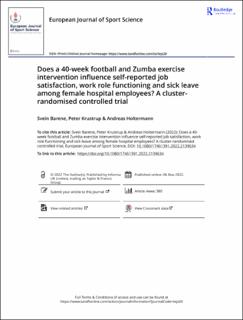Does a 40-week football and Zumba exercise intervention influence self-reported job satisfaction, work role functioning and sick leave among female hospital employees? A cluster-randomised controlled trial
Peer reviewed, Journal article
Published version
Permanent lenke
https://hdl.handle.net/11250/3052290Utgivelsesdato
2022Metadata
Vis full innførselSamlinger
Originalversjon
10.1080/17461391.2022.2139634Sammendrag
This 40-week cluster-randomised controlled trial (RCT) examines the effects of football and Zumba on self-perceived job satisfaction, work role functioning and sick leave among Norwegian female hospital employees. Hundred-and-seven employees, mainly consisting of nurses (80%), were allocated into three groups; Football (FG), Zumba (ZG) and Control (CG). The exercise groups were offered two to three and one to two 1-h weekly sessions during the first 12 and last 28 weeks, respectively, with an actual weekly exercise frequency of 2.4 ± 0.5 and 0.9 ± 0.2 in FG and 2.3 ± 0.3 and 0.8 ± 0.2 in ZG. Outcome variables were measured at baseline, 12 and 40 weeks. In comparison to CG (4.8 days 95% CI 3.2–6.4), ZG (1.9 days, 95% CI 0.4–3.5) had a significant lower overall mean days of sickness absence during last sick leave period (−2.9 days, 95% CI −5.1 to −0.7, p = .011) which corresponded to a moderate effect size (d = 0.60). Between baseline (88.5%, 95% CI 84.3–92.6) and 12 weeks (93.8%, 95% CI 89.4–98.2), ZG showed significant within-group improvement in total score of the Work Role Functioning Questionnaire (WRFQ) (5.3%, 95% CI 0.6–10.1, p = .029), corresponding to a moderate effect size (d = 0.40). This study indicates that two to three 1-h weekly Zumba sessions can have a preventive effect on sick leave in female hospital employees. Highlights Participants in Zumba exercise organised by the workplace showed a significant lower number of sick leave days compared with the controls. Despite a correspondingly significant reduction in exercise adherence in both groups in the last 28 weeks, only FG showed tendencies for group improvement in job satisfaction and total WRFQ in this period. Workplace promotion of exercise and physical activity can thus be beneficial for both the workers and the organisation.

